|




|
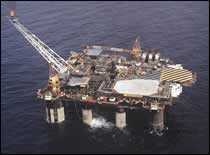
Semi-submersible Production Platform |
|

The oil and gas
industry is an exciting and dynamic one in which to work. As the search
for hydrocarbon deposits throughout the world moves into ever-increasing
water depths, there is a growing demand for technological solutions to complex
engineering challenges. Exploration in water depths down to 3,000m (approaching
2 miles) is ongoing in several locations. The challenges are further compounded
by the very harsh environmental loadings imposed by wind, waves and currents
frequently encountered in these areas and which offshore structures must
withstand over their design life.
|
|
|

 MCS International has its headquarters in Galway, and overseas offices
in the main oil centres of Houston and Aberdeen. The company specialises
in leading edge technology, consulting and software services and successfully
sells them throughout the world. Areas of expertise include drilling and
floating production systems such as:
MCS International has its headquarters in Galway, and overseas offices
in the main oil centres of Houston and Aberdeen. The company specialises
in leading edge technology, consulting and software services and successfully
sells them throughout the world. Areas of expertise include drilling and
floating production systems such as:
- Floating platforms
- Flexible risers
and flowlines
- Tanker off loading
systems
- Steel and titanium
catenary risers
- Mooring systems
- Tensioned drilling
and production risers
- Ancillary equipment
- Other subsea components
|
|

Clients include all
of the major oil companies, turnkey contractors,
fabricators, shipyards, equipment manufacturers and installation
contractors, the majority of which are located outside Ireland. The company
has worked on offshore field developments in the North Sea (UK and Norwegian
sectors), Atlantic margins (offshore Scotland), US Gulf of Mexico, Australia,
Brazil, west of Africa, Far East, the Mediterranean, Argentina, and on
feasibility studies for fields offshore Ireland.

The multidisciplinary
nature of the work means that staff come from backgrounds such as civil
engineering, mechanical engineering, naval architecture and software /
IT. All hold higher honours primary degrees, and most have postgraduate
qualifications.
|
|
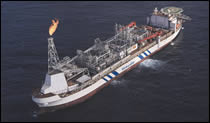
Floating Production System
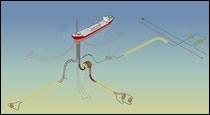
Deepwater Floating Production Concepts
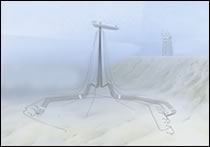
Deepwater Floating Production Concepts
|
|
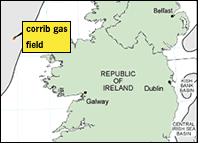 |
|

The Corrib Gas Field,
located in the Slyne Trough 70 km off the North Mayo coast, was discovered
in 1996. By Year 2000 a third successful test had been carried out on the
gas field. Initial indications suggest that the Corrib gas is high quality,
dry and free of contaminates.
Technical challenges
will need to be overcome in delivering the gas as the field is situated
some 350 m below water, compared with the Kinsale field at 100 m below
water level. A commercial and technical appraisal of the Corrib Field
is required before the operator,
|
|
 
Enterprise Energy Ireland Ltd., will approve commencement on the development
of the field.
It is forecast that
production could commence in early 2003 and that the field could supply
around 60 to 70% of Ireland's gas demand by 2005. The field is of significance
for Ireland as the Kinsale Head, the country's first major gas field,
is due to cease production in late 2003 or early 2004.
The Corrib Gas Field
Project will involve major engineering works including sub sea structures,
subsea pipeline, on shore facilities and gas pipelines to connect to the
national grid.
|

